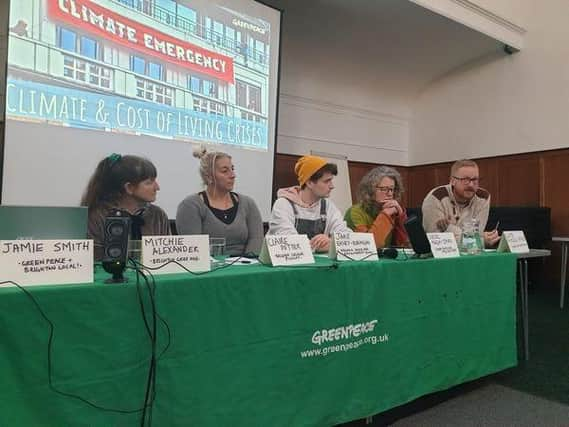Press release for immediate release 'The Cost of Living in Brighton'


This documentary, made by Greenpeace in partnership with the New Economics Foundation, tells the story of volunteers in food banks and community centres in the Rother Valley, Yorkshire. The film depicts how communities hard hit by the cost of living crisis are pulling together to support each other at this difficult time and how properly insulating homes can help tackle the cost of living and climate crises.
Greenpeace Brighton Local Group, as part of the Warm This Winter Coalition, is campaigning for the cost of living and climate crises to be solved by investing in renewable energy, properly insulating homes and providing people with the skills and training needed to deliver this green energy revolution. Greenpeace is calling for at least £6 billion to be spent on implementing a national insulation and energy efficiency programme during this parliament. People living in poorly insulated homes will have to pay almost £1,000 more than others on their energy bills this winter Data from the End Fuel Poverty Coalition shows that almost a quarter (24.5%) of UK households are currently experiencing fuel poverty .
Advertisement
Hide AdAdvertisement
Hide AdOn the eve of the autumn statement, the trailer for the film was projected onto Prime Minister Rishi Sunak’s house in his Yorkshire constituency to encourage him to address the issues shown in the film. Around 30 people watched the documentary at Friends Meeting House, one of more than 40 screenings taking place across the UK this winter. The screening was followed by a panel discussion, with Lloyd Russell-Moyle MP Kemptown, Cllr Siriol Hugh-Jones, Mitchie Alexander - Brighton Grub Hub, Jake Easby-Robinson - Brighton Peace and Environment Centre, Claire Potter -Sussex Uni/Brighton Circular Economy.
Lloyd Russell-Moyle MP joined the panel and spoke about how two thirds of our energy is actually homegrown but all of it is sold at the international rate and this includes green energy produced in the UK. Lloyd Russell-Moyle went on to say that this situation is not the same in other countries, such as France but a series of privatisation schemes have made energy much more expensive for the UK householder.‘The Cost of Living’ film depicts towns in the Rother Valley, but the experience of people living in Brighton is very similar. We are facing enormous energy bills, and more and more people are relying on the community to help put food on their table and provide a warm refuge. Food banks and community centres are being stretched to the limit as winter approaches. Jake Easby-Robinson - Brighton Peace and Environment Centre pointed out that the pressures of the cost of living crisis is not being experience equally – with the poorest suffering the most. Others in the meeting agreed including Rachel Ormond from Hove who said that “Landlords don’t have the incentive to insulate as they are not paying the energy bills”Claire Potter -from Sussex Uni/Brighton Circular Economy said that it is criminal that new houses are being built with the highest possible energy efficiency. Clair potter also referred to a 10-week course that is being developed for schools on how resources can be used more efficiently. Anne Massey from Montpellier said that “In last month’s Budget, the Government seems to have realised that home insulation needs to be done, but not quite how urgently we need to do it. Home insulation will make our homes permanently warmer, and our bills permanently lower, as well as reducing our carbon emissions. Almost a quarter of the country is in fuel poverty right now and we need an urgent insulation programme now to fix this. Ministers shouldn't be waiting another three years to do what should have happened years ago.“
Recent polling conducted by Survation on behalf of Greenpeace shows that 60.4% of people in the South of England have had to make cuts to other spending due to rising energy bills, and 60.2% feel that their standard of living has got worse since the last general election. 74.5% in this region would support a government programme to install home insulation in their area.A recent report [5] by Cambridge Econometrics on behalf of Greenpeace UK, highlights how a government backed programme to insulate homes and install heat pumps could inject £6.8 billion into the economy every year and create almost 140,000 new jobs by 2030. These green home upgrades could provide huge economic and social benefits - including to those on low incomes, older people and People of Colour, who tend to be most exposed to fuel poverty - while slashing bills and carbon emissions.